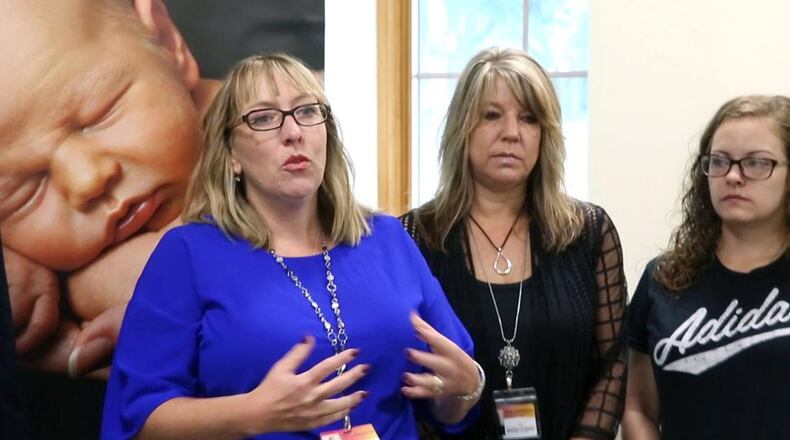Without Brigid’s Path, more than half of those babies would have been discharged directly into foster care from the hospital. Instead, they were able to safely go home in the care of family.
Brigid’s Path is the first facility in the state of Ohio and the second in the nation to offer an in-patient, home-like approach to serving babies born exposed to addictive substances.
MORE: Kettering treatment center that helps babies can grow with passing of new bill
Ohio will mark Neonatal Abstinence Syndrome (NAS) Awareness Week from July 1-7. Started by then-Ohio Gov. John Kasich in 2016, the week is designed to help raise awareness of the effects of addiction.
Babies with NAS are helped at Brigid’s Path and the upcoming week is a key time for the agency to show its impact on the community, according to Jill Kingston, founder and executive director for the organization.
“There’s a common misconception that the babies who come to Brigid’s Path are addicted to the substance they were exposed to in the womb, and that’s not true,” she said. “They are not addicted because of their prenatal exposure, but they do still experience withdrawal symptoms like trembling, seizures, high-pitched crying and vomiting.”
The majority of babies served at Brigid’s Path have come from Montgomery County, but the nonprofit also has also served families from Warren, Greene, Miami, Butler, Fayette and Clinton counties.
“Our primary work is to care for infants born exposed to an addictive substance like prescription medication, opioids or other drugs,” Kingston said. “Our skilled medical staff and volunteers shower our babies with love and attention 24 hours a day, 7 days a week.”
MORE: Kettering care center gets national attention with Trump’s State of the Union
Anyone can refer a family to Brigid’s Path, including a clinician, family member of a pregnant mother, or the expectant parents themselves.
“Doing the right thing takes courage, especially in the face of skepticism and cynicism. We believe helping mothers and babies is the right thing,” Kingston said. “There’s no doubt we’re having an impact on lives here in the Miami Valley. It’s incredible to be advocates for people who have never had an advocate before and help them see options for a better life.”
As the nonprofit approaches its two-year anniversary in July, the passage last year of the Caring Recovery for Infants and Babies Act, or CRIB Act, has given it a boost financially.
The CRIB Act earned support from U.S. Rep. Mike Turner, R-Dayton, in the House and Sens. Sherrod Brown, D-Ohio, and Rob Portman, R-Ohio, in the Senate.
Passage of the legislation now allows Medicaid to cover certain health care services provided to infants in residential pediatric recovery facilities and hospitals. It also clarifies that babies receiving services in residential pediatric recovery centers can continue to receive services after one year of age, and provide for activities to encourage caregiver-infant bonding.
“The passage of the CRIB Act has been a mixed blessing for us,” Kingston said. “We’re hopeful that we’ll receive additional funding through Medicaid as a result of its passing, but the amount and timing of the receipt of that funding is dependent on the state of Ohio. So, many people think we’re already receiving funding from the passage of the CRIB Act – but in reality, we are not.”
Kingston hopes Brigid’s Path will eventually be able to receive Medicaid funding to cover some health care services for babies.
Currently, Brigid’s Path receives 77% of its funding from private individuals, foundations and grants. The remaining 23% of its funding comes from contributions and grants from local and state agencies.
Inpatient hospital treatment costs an average of $6,000 per infant per day. At Brigid’s Path, the same treatment averages just $1,000 per day, costing 83% less per day of treatment according to Kingston.
“Brigid’s Path is an independent organization. We are not affiliated with any health system but do collaborate with all major health networks in the Miami Valley,” she said. “Brigid’s Path is able to help relieve some of the Ohio taxpayer financial burden associated with the current drug epidemic.”
Brigid’s Path was recently selected as one of 15 national nonprofit partners for a new cohort of the Stand Together Foundation, an organization committed to breaking the cycle of poverty by supporting creative solutions of individuals and communities across the country.
“This means we’ll be working with other nonprofits at a national level to learn what’s working for others, share our outcomes, and implement what we learn to help us continue to grow and thrive. And, this broadens awareness of Brigid’s Path at a national level, which offers us additional opportunities for support from people outside our immediate community,” Kingston said.
She added, “There’s still a lot of work to be done in the battle against addiction. It’s not a fight we see ending any time soon, but we’ll continue to work with partners locally, regionally and nationally to make a difference.”
MORE: Drug and alcohol abuse efforts draw dozens to Washington Twp. event
CONTACT INFORMATION
July 1-7, Ohio will mark Neonatal Abstinence Syndrome (NAS) Awareness Week. Brigid’s Path, a Kettering facility, specializes in the treatment of babies experiencing NAS.
Brigid’s Path’s family advocates work with pregnant mothers or mothers of newborns to help guide them through the process of becoming a Brigid’s Path family.
To make a referral, call the main Brigid’s Path phone number (937-350-1785) and press 4.
About the Author
